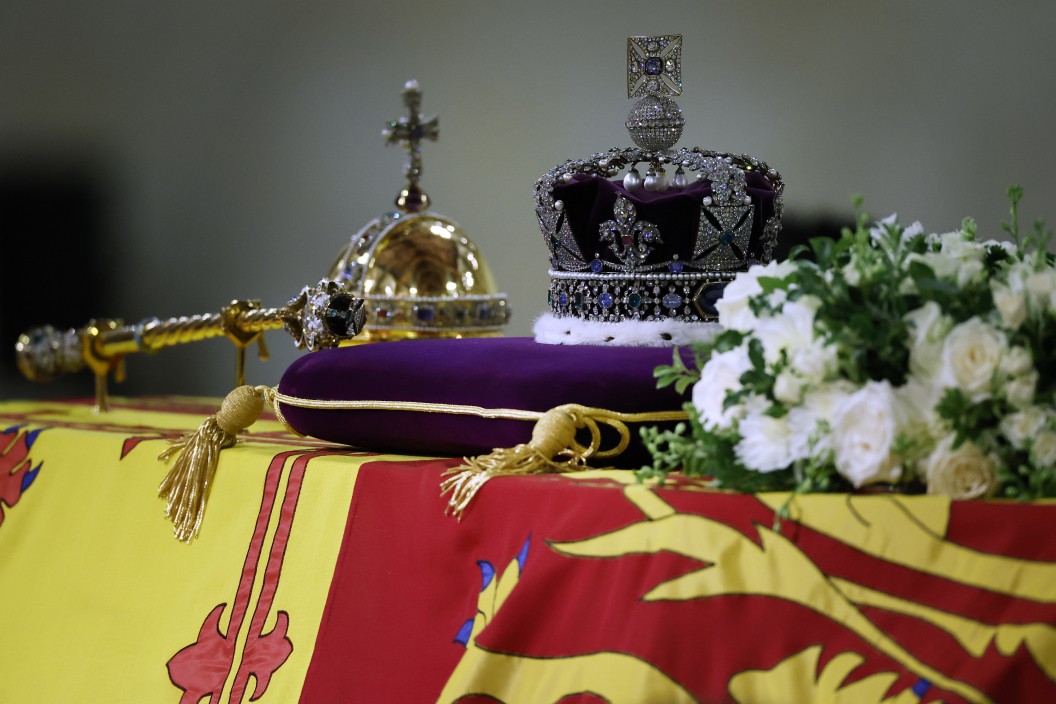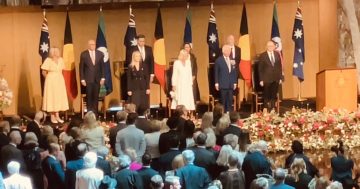
Queen’s coffin lying in state: is it possible to separate the women from her role? Photo: Royal.UK.
I was in Edinburgh the day the Queen died. I was walking through the rain, sharing an umbrella with my Scottish friend, when the news landed. We glanced down at our phones, read the notifications, and paused for a moment on the cobblestones of Rose St.
“Huh,” I said.
My friend, vocally anti-monarchist that she is, shrugged. We continued to dinner. At one point, though, we both sighed and shared a moment of anticipatory frustration at what we could expect over the coming weeks regarding news coverage, social media posts and general conversation. It would be Queen Elizabeth, 24/7, non-stop.
I’m writing this on the day of her funeral, from Heathrow Airport, as I wait to board a flight home. The past week since the Queen’s death has indeed delivered countless posts of commemoration, flashbacks to her youth, odes to her grace and commitment to the public good, etc etc. There have been a few critiques of her position, what it symbolises for the British people, and the colonial history and continued power of the UK.
But in general, I’ve been surprised at how many people in my own circles have harboured a special soft spot for HRM.
Many of my politically progressive British and Australian friends say they don’t really support the monarchy. That they find it infuriating that the effects of economic inequality are worse than ever in the current global climate and that the royal family is compensated with public money that could be put to better use.
But at the same time, they express a sort of nostalgic reverence for the Queen herself.
“She was a good person,” they say. “She loved horses and dogs! She was so elegant and refined when young and so sweet and kind when old. I don’t like the Royal family, but Queen Elizabeth was different.”
I have to question – how so?
I have always been a believer in playing the politics, not the person, but in the case of the Royal family, it’s tricky. In my mind, there is a clear difference between the person, Elizabeth, and the position of Queen. People close to her will, of course mourn the individual that they knew and loved. But for the rest of us, her position has coloured everything we know about her as an individual, and that’s inevitable.
If you have progressive politics, and believe that the monarchy is an outdated system of hierarchy that entrenches poverty and inequality and capitalises on the historical wrongs of Britain as a colonial power, then can you really mourn the Queen as an individual? Does it not feel contradictory to post tributes to her on social media? Isn’t it inherently paradoxical to claim you know anything about her as a ‘person’ while also knowing that the position of Queen is ultimately the product of dozens of individuals who all contribute to constructing the image and personality that is eventually provided for public consumption?
Suppose you believe that the Queen deserves our respect in her passing and should be commemorated and celebrated. In that case, it means you ultimately support the monarchy and the system that supports them. If that’s the case, you’re entitled to your beliefs, but there’s no point trying to find a middle ground because there really isn’t a grey area here. What you know and love about the Queen would not be possible without her life of wealth and privilege.
Death is sad, and I won’t begrudge anyone the right to grieve as they wish. I know many people feel deeply connected to Queen Elizabeth because her presence has been a constant throughout the seminal decades of their lives. She symbolises something to them that has little to do with her actual actions or personhood but has more to do with their emotions about ageing, the passage of time and change.
I don’t understand it, and I can’t feign interest in the death of someone I didn’t know and who symbolised and benefited from a system that caused violence, upheaval and colonial atrocities in all three countries I am linked to.
I know that some will think it’s in poor taste to critique the death of an old lady. It may be seen as disrespectful, opportunistic. But when an individual benefits so much from the oppression, labour and disadvantage of so many, based on nothing other than their bloodline, I feel they forego the usual sensitivities afforded to normal people.
Her life was supposedly lived in service to the public. It is reasonable, then, for her death to facilitate important public conversations on the role and impact of the monarchy – and whether the latter justifies its continued existence.





















